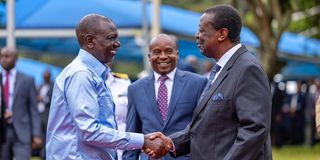President Ruto convenes third cabinet retreat in Nairobi

President William Ruto is leading the third National Executive Retreat, which marks a critical moment in the mid-term review of his administration as the sixth Kenya Kwanza government evaluates its performance since taking office in September 2022.
What you need to know:
- President William Ruto's administration is holding its third National Executive Retreat to review the performance of the Kenya Kwanza government since September 2022.
- The focus is on the Bottom-Up Economic Transformation Agenda (BETA Plan).
- The review will assess progress on the six strategic pillars, which include lowering the cost of living, creating jobs, and improving foreign exchange reserves.
President William Ruto on Thursday convened the 3rd National Executive Retreat, marking a critical moment in his administration’s mid-term review as the Kenya Kwanza government evaluates its performance since assuming office in September 2022.
Dubbed a “watershed moment”, Secretary to the Cabinet Mercy Wanjau says the two-day retreat brings together Cabinet Secretaries, Principal Secretaries and senior government officials to assess the gains made under the Bottom-Up Economic Transformation Agenda (BETA Plan), identify bottlenecks, and chart the way forward in delivering promises made to Kenyans.
“This mid-term review is not just about government milestones. It is about national progress measured by the lived experiences of our citizens,” Ms Wanjau said.
The meeting is being held at KCB Leadership Centre in Karen, Nairobi.
“It is a time for bold decisions and honest assessments. The outcomes of this retreat will help shape the legacy of the fifth administration," she said.
Government Spokesperson Isaac Mwaura said the retreat will offer a forum to reflect on “what we have achieved, the challenges we face, and the strategies needed to move forward.”
Central to the review is the progress of the administration’s six strategic pillars: lowering the cost of living, eliminating hunger, job creation, broadening the tax base, improving foreign exchange reserves, and fostering inclusive growth.
Targeted investments in key sectors—agriculture, health, MSMEs, housing, and the digital and creative economy—are cited as drivers of these goals.
Ms Wanjau said digitisation efforts, such as onboarding 22,000 public services onto the eCitizen platform, have improved efficiency, including for persons with disabilities. She also praised reforms such as the fertiliser subsidy programme, which contributed to a bumper harvest, though she warned of post-harvest losses due to storage and market gaps.
Other legislative and policy wins spotlighted include the enactment of the Affordable Housing Act, four critical laws supporting Universal Health Coverage, and the Credit Guarantee Scheme supporting MSMEs.
However, the retreat has also brought to the fore areas of concern.
The 2025 Economic Survey indicates that employment growth remains sluggish, particularly among the youth and vulnerable populations. Fiscal constraints and rising debt levels have also limited the government’s ability to fully implement some of its programmes.
“We recognise that despite significant progress, employment levels are below target, and our fiscal space is constrained. These are pressing issues we must address collectively,” Ms Wanjau noted.
In a recent interview by Nation, Prime Cabinet Secretary Musalia Mudavadi, described the administration’s first 1,000 days as “solid” despite mounting public frustration over the high cost of living.
“We have managed to stabilise the economy. Inflation has been brought down to about 3 percent, foreign reserves are nearing $10 billion, and the Kenya shilling is holding up,” Mr Mudavadi said in an interview with Nation.
He singled out the affordable housing programme as a transformative initiative, citing recent handovers in Mukuru and ongoing projects targeting 200,000 units annually. “This is changing lives,” he said.
But even as he defended the administration’s track record, Mr Mudavadi acknowledged the pain felt by Kenyans. “The cost of living is still biting. We are increasing food production and working to make inputs like fertiliser affordable. But we must do more.”
He also addressed fiscal sustainability, noting the government’s efforts to contain public expenditure and engage with the IMF to boost investor confidence.
Politically, Mr Mudavadi defended President Ruto’s outreach to ODM leader Raila Odinga, framing it as a pragmatic move to stabilise the country. He dismissed claims of an “unholy alliance” with regional leaders, insisting Kenya’s foreign policy remains firmly grounded.
As the Cabinet engages in high-level discussions over the next two days, expectations are high that the retreat will produce actionable commitments to address unemployment, fiscal stress, and implementation gaps.
The administration is under pressure to convert policy wins into tangible outcomes that resonate with ordinary citizens.
“This is about results,” Ms Wanjau added.
“Execution excellence and reform resilience will define the second half of the Kenya Kwanza term,” she said.


